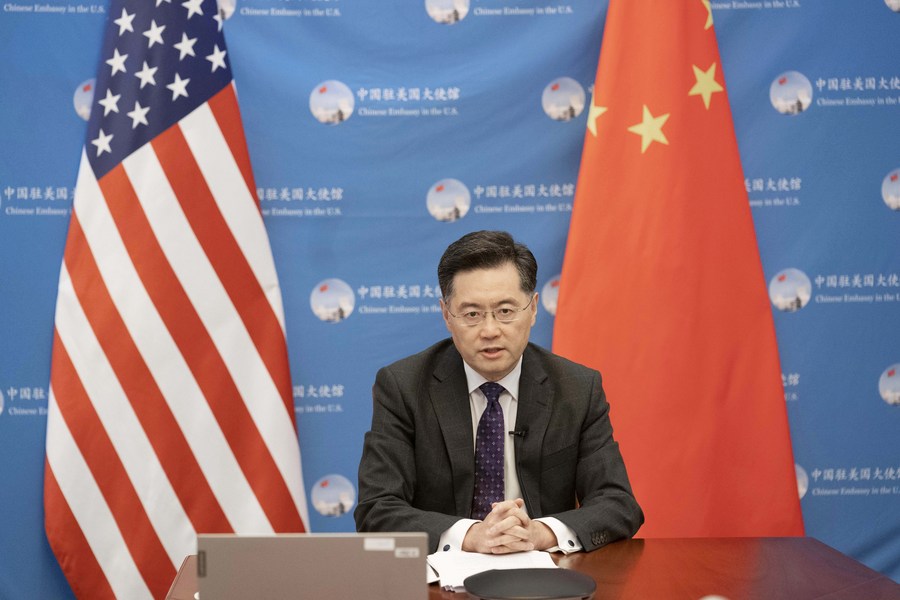China, Russia ambassadors urge to stop using "value-based diplomacy" to provoke division, confrontation
 Chinese Ambassador to the United States Qin Gang attends a virtual conversation jointly held by the Carter Center and the George H.W. Bush Foundation for U.S.-China Relations in Washington, D.C., the United States, Sept. 22, 2021. (Xinhua/Liu Jie)
Chinese Ambassador to the United States Qin Gang attends a virtual conversation jointly held by the Carter Center and the George H.W. Bush Foundation for U.S.-China Relations in Washington, D.C., the United States, Sept. 22, 2021. (Xinhua/Liu Jie)
"This trend contradicts the development of the modern world. It is impossible to prevent the shaping of a global polycentric architecture but could strain the objective process," Chinese Ambassador to the United States Qin Gang and Russian Ambassador to the United States Anatoly Antonov say, adding "China and Russia firmly reject this move."
Chinese and Russian ambassadors urged to stop using "value-based diplomacy" to provoke division and confrontation at this critical time that stronger coordination and cooperation are in urgent need in addressing an array of global challenges including the COVID-19 and climate change.
Chinese Ambassador to the United States Qin Gang and Russian Ambassador to the United States Anatoly Antonov made the remarks in their co-authored article Respecting People's Democratic Rights published on The National Interest website on Friday.
Calling the upcoming U.S.-led so-called online "Summit for Democracy" "an evident product of its Cold-War mentality," the ambassadors said the event will "stoke up ideological confrontation and a rift in the world, creating new 'dividing lines.'"
"This trend contradicts the development of the modern world. It is impossible to prevent the shaping of a global polycentric architecture but could strain the objective process," they said, adding "China and Russia firmly reject this move."
The ambassadors noted peace, development, fairness, justice, democracy, and freedom are common values of humanity. Democracy is not a prerogative of a certain country or a group of countries, but a universal right of all peoples. "It can be realized in multiple ways, and no model can fit all countries," they added.
Whether a country's path works depends on whether it meets the country's realities, follows the trend of the times, and brings about economic development, social stability and progress, and better lives for the people, the article said. "Ultimately, it relies on the support of the people and will be proven by its contribution to human progress."
"Therefore, a basic criterion of democracy should be about the people, i.e. whether the people have the right to govern their country, whether their needs are met, and whether they have a sense of fulfillment and happiness," the ambassadors wrote.
"If the people are only awakened when casting their votes and sent back to hibernation when the voting is over, if they are served with sweet-sounding slogans in campaigns but have no say after the election, if they are wooed during canvassing but left out in the cold after that, this is not a genuine democracy," they added.
 File photo taken on April 15, 2016 shows Anatoly Antonov during an interview with Xinhua in Moscow, Russia. (Xinhua/Bai Xueqi)
File photo taken on April 15, 2016 shows Anatoly Antonov during an interview with Xinhua in Moscow, Russia. (Xinhua/Bai Xueqi)
What China has is an extensive, whole-process socialist democracy, which reflects the people's will, suits the country's realities, and enjoys strong support from the people, the article said.
Russia is a democratic federative law-governed state with a republican form of government, the article said, noting that democracy is the fundamental principle of Russia's political system.
"Democracy is not just about domestic governance; it should also be reflected in international relations. A truly democratic government will support democracy in international relations. It will not foster hegemony and division abroad while building democracy and unity at home," the ambassadors said, noting "the path to prosperity of nations goes through respectful cooperation with each other, despite some differences in views on particular issues."
They said the sovereignty, security, and development interests of a country should not be violated, noting that interfering in other countries' internal affairs under the pretext of fighting corruption, promoting democratic values, or protecting human rights, hindering their development, wielding the big stick of sanctions, and even infringing on their sovereignty, unity and territorial integrity "go against the UN Charter and other basic norms of international law and are obviously anti-democratic."
International affairs should be handled in accordance with the principles of extensive consultation, joint contribution and shared benefits, and decided in the spirit of true multilateralism, the ambassadors said. "Seeking supremacy and putting oneself always first are acts of hegemonism and unilateralism, and are obviously anti-democratic."
There has seen no shortage of wars and turmoil worldwide to prove that spreading "democracy," its political system, and values against other countries' will severely undermine regional and international peace, security, and stability, the ambassadors said, adding bombings of Yugoslavia, military intervention in Iraq, Afghanistan, and Libya, and "democratic transformation" do nothing but harm.
They called on countries to focus on running their own affairs well, instead of condescendingly criticizing others. "Certain foreign governments better think about themselves and what is going on in their homes. Is it freedom when various rallies in their countries are dispersed with rubber bullets and tear gas? It does not look very much like freedom," said the ambassadors.
Faced with an array of global challenges, countries urgently need to strengthen coordination and cooperation for common progress, especially today when the international community needs to improve cooperation between all countries to counter the pandemic, foster economic development, and neutralize cross-border threats, said the ambassadors.
"China and Russia call on countries: to stop using "value-based diplomacy" to provoke division and confrontation; to practice mutual respect and win-win cooperation in international relations, and to work for harmonious coexistence between countries with different social systems, ideologies, histories, cultures, and development levels," concluded the ambassadors.